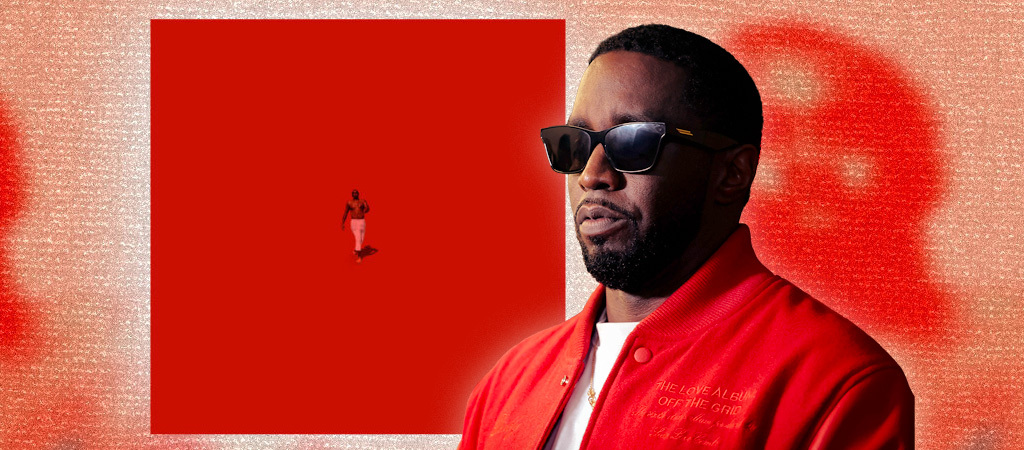Say what you want about Sean Combs, aka Diddy — and a lot has been said about the man formerly known as Puff Daddy, both good and bad — but as a producer and an artistic force in the music industry, he is undeniable. He has been for a very long time.
He brings all that irresistible force to bear on his new project, The Love Album: Off The Grid. Incredibly enough, it’s only his fifth studio album to date despite his 30-plus years as a recognizable name in the music business.
It’s also his first solo album as Diddy since 2006’s Press Play and his first album as Diddy overall since the 2010 collaborative album Last Train To Paris (a 2015 mixtape, MMM (Money Making Mitch), was credited to his former moniker, Puff Daddy).
Like Diddy’s previous projects dating all the way back to his first, the 1997 debut album No Way Out (released as Puff Daddy & The Family), calling this a solo album feels like a stretch. Even then, Puff’s albums were littered with features and showcased his prowess as a producer as much as a vocalist (a thing I’ve always found cool about Diddy is his proficiency as a rapper despite not writing the verses — it’s a lot harder than it sounds).
The Love Album: Off The Grid is no anomaly in that respect. With 23(!) tracks, the album features nearly 30 credited guest artists, from Puff Daddy contemporaries like Busta Rhymes, Mary J. Blige, Babyface, and John Legend to contemporary stars such as 21 Savage, H.E.R., Justin Bieber, and Summer Walker.
It’s also a showcase for rising talents, both those under the umbrella of Diddy’s own Love Records and otherwise. Songwriters Jozzy and Nova Wav receive some spotlight, as does Compton rap-singer Kalan.FrFr. The album is, to paraphrase Diddy’s own words, something of a love letter to R&B as much as it is a hip-hop album from the self-described “greatest rapper that ever lived” (a quote from “Stay Awhile” with Nija — one of greatest rap lies in hip-hop’s 50-year history, to be sure. You sort of have to respect the audacity).
In fact, somewhere around the midpoint of the album, Diddy basically disappears almost entirely. This feels odd to write, but you kinda wish Diddy’s much-touted comeback album featured more… well, Diddy.
Think about all the hits the rapper-producer has been responsible for over the years: the “Benjamins”; the “I Need A Girl” parts one and two; the “Pass The Courvoisiers.” For all the accusations of shady business practices and not actually writing raps or making beats, he’s always been the best part of those collaborations, often through the sheer magnitude of his personality. It’d be nice to get more of that here.
Fortunately, the other hallmark of Diddy’s storied career has been his ear for talent. And, my God, what a collection of talents is arrayed here. It’s nearly impossible to choose a standout. The Dirty Money reunion “Deliver Me” is candy for the ears. Not even a poorly advised Fabolous cameo can drag down an all-time performance from Jacquees on “Pick Up.” (For the life of me, I cannot understand why men in rap close ranks around proven abusers; there’s more nuance in this discussion than can be shared here, but still… it’s so easy to just… not.)
Ty Dolla Sign and Coco Jones form a heavenly combo on “Reachin’.” H.E.R. remains magnificent on “Space.” And the touching “Kim Porter” wisely employs two of R&B’s greatest emotional songwriters ever for Diddy’s tribute to The One Who Got Away.
However, the back half of the album, which you can imagine Diddy meant as an ode to Quiet Storm and slow jams, becomes a slog as the tempo winds its way lower and lower ’til it gets stuck in the mud. It wastes all those great performances because the first half of the album is vintage Diddy.
The funk bop of the album opener “Brought My Love” with The-Dream and Herb freaking Alpert is a welcome dodge away from the conventions of modern rap. It’s upbeat, fun, reminiscent of Diddy’s best without being derivative, and taps into the contemporary wave of dancefloor-ready rap without being gimmicky.
“Homecoming” with Jozzy updates Diddy’s favorite approach to sampling (Ecstasy, Passion & Pain’s “Born To Lose You”), and “It Belongs To You” is slinky bedroom funk at its best. But then the first intermission hits and the production switches to that murky, Drake-esque slush — which has its place, to be fair. But the thing about Quiet Storm is there still needs to be some… let’s say “motion in the ocean.”
A lot of the back half is great from a songwriting and performing standpoint but placid and downright inert if you’re thinking of “music you make love to.” Diddy made a lot of fuss about bringing R&B “back” with this album but had he been paying attention, he’d have seen it never left — and he could have incorporated more of what modern singers like Lucky Daye, Arin Ray, Ari Lennox, SZA, Cleo Sol, Khalid, Tems, Victoria Monét, and more have been doing all along.
But what’s here is still a great sampling of what’s out there — in fact, it’s more of a smorgasbord, for better or worse. It’s overstuffed, indulgent, and overlong, but it’s also sumptuous, charismatic, and satisfying, if not sonically audacious. Basically, it’s all the things you want from a Diddy album.
The Love Album: Off The Grid is out now via Love Records and Motown.







